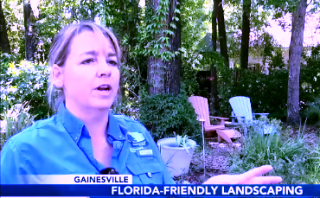|
Article Courtesy of
WCJB Channel 20
By
Alex Carter
Published July 14, 2022
|
WATCH VIDEO |
|
GAINESVILLE - You see it in all the commercials. Everyone wants a lush, green
yard, especially during the summer months.
But the green grass may not be as useful to your property as you think.
|
Senior Environmental
Specialist Hollie Greer with the Alachua County Department
of Environmental Protection emphasizes that “we want to move
away from that idea of a resource-intensive, bright green
lawn to something that’s more natural.”
The department emphasizes nine principles to have a
Florida-friendly landscape, and all are aimed at reducing
the number of resources we use and bringing animal habitats
to our yards.
Alachua county adopted the code for Florida-friendly
landscaping and provides assistance when there are
misunderstandings of that code between homeowner’s
associations and homeowners. |
|
|
For example, neighborhoods that have turf grass requirements might not have
realistic expectations for certain homes.
Hollie says sometimes grass “works because it’s the right plant in the right
place. But if trees shade those areas over time and the HOA’s are still
requiring homeowners to try to keep grass alive, it may not be the right
plant in the right place anymore.”
That’s where the nine principles of Florida-friendly landscaping come into
play.
One of those is utilizing mulch versus turf grass or sod.
Cynthia Leary is an IFAS Extension Agent who explains “Mulch is really gonna
keep the moisture in the soil where the plant wants to access it and really
reduce the amount of moisture you’re going to lose to the air, especially
when we get our hot summers.”
Reducing the amount of moisture lost is essential to reducing water waste.
Jon and Suzi Graham are Gainesville homeowners who participate in a turf
swap program.
The Grahams said they don’t water a lot of plants that they used to. Through
the turf swap program, they leanred that most of the big plants around the
house don’t need water at all once their foundation is built. For plants
that do need water, the Grahams use drip irrigation underneath the mulch,
which uses much less water, citing an 80% decrease in usage.
IFAS emphasizes planting native plants will also make your gardening
experience leave less of a footprint.
For details on
Florida-friendly landscaping, visit here.
|
